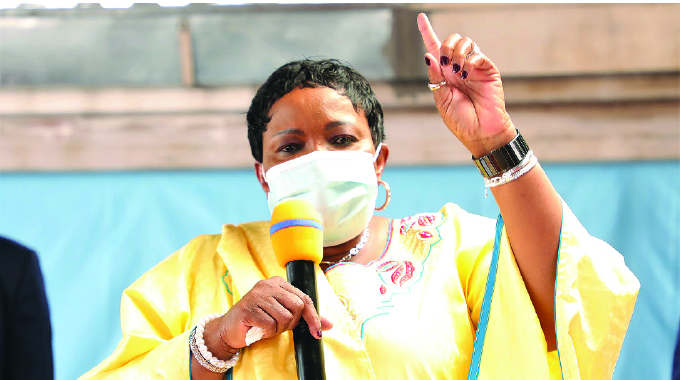First Lady mentors Bulawayo residents, champions empowerment

Tendai Rupapa in BULAWAYO
FIRST LADY Auxillia Mnangagwa yesterday brought her educative and highly interactive Nharirire Yemusha programme here with the aim of moulding morally upright citizens.
Amai Mnangagwa also reinforced her drive to economically empower women and youths through the introduction of community projects for income-generation.
The First Lady introduced Nharirire Yemusha programme following complaints raised by children during the Gota/Nhanga/Ixiba programme that parents no longer had time with them, hence the surge in drug abuse, teen pregnancies and lack of morals.
The participants came up with the qualities of a model woman and man for the province to help promote good morals, reduce delinquency among children and the collapse of marriages.
So oversubscribed was yesterday’s programme that there was an overflow with people seeking to benefit from the mother of the nation’s teachings.
Amai Mnangagwa had to conduct two sessions to satisfy demand.
World Health Organisation (WHO) Covid-19 protocols of washing hands, masking up and maintaining social distance were religiously followed.
Before the start of the proceedings, the First Lady, who has a passion for the economic empowerment of the country’s citizens, implored the residents from five districts who were present to form groups that would be offered training to start the projects.
“Before I start today’s programme, I heard there are five districts represented here, so to women and youths, I want you to form groups and I will come with my Angel of Hope Foundation and train you on various income-generating ventures,” she said.

Women and men present their Covid-19 vaccination cards upon entering the venue for Nharirire Yemusha session organised by First Lady Auxillia Mnangagwa in Bulawayo yesterday
Speaking about Nharirire Yemusha, the First Lady said; “I have come so that we mould a woman who is suitable to run a household. As a province we know the woman we want and this is the one we seek to mould here. We also implore men to come up with an ideal father figure capable of fending for his family.”
She said the move she has taken had been influenced by challenges being faced by children which had been attributed to parents.
“This has been caused by the challenges we are seeing and hearing from children. I am moving with the Nhanga/Gota/Ixiba programme where children are saying a lot. They are saying parents no longer have time with them. When they come home from school the mother will not have bathed while busy on her phone while the father will be busy chatting on WhatsApp.
“So children are saying this is influencing them to do as they please. But these are the children we are looking forward to for the future. We want to teach each other that a child’s manners begin in the home. Parents are also fighting in front of the children while girls are falling pregnant before the time is right.
“On the other hand, boys have been ruined by drugs. Gender-based-violence (GBV) cases are rising each day. We are also seeing the elderly going their separate ways, divorce cases have shot up.
“Who is starting to beat up the other or scolding the other partner between men and women,” she probed.
In response, an elderly woman Gogo Nokuthula Ncube said women were to blame.
“It is us women who start violence due to lack of respect for the husband and not giving him his rightful place. Some women embarrass their spouses in front of children and visitors,” she said.
Another discussant, Mrs Precious Takaidza, concurred with Gogo Ncube saying, “Women use painful words towards their husbands, especially when shouting. Even if my husband raises his voice, I must lower mine to build my home. A soft response cools down tempers.”
One man also pointed an accusing finger on women saying they tormented men.
“Women are tormenting us. The bedroom is like a courtroom. Even issues that happen in the morning are spoken about in the evening harshly. These women must appreciate that a bedroom is not a courtroom,” he said.
An elderly man chipped in saying violence in homes was triggered by women who did not want to work and help their husbands in looking after the children.
“As a man I will be working hard to sustain the family, but the day I fail to buy meat, all hell breaks loose. These women should also work so that we help each other were necessary,” he said.
Amai Mnangagwa weighed in saying all those negatives would change through the empowerment of women.
“It is going to change Baba, violence will decrease because I am going to empower women here by introducing them to income generating projects,” she said.
Mr Philani Moyo said it was essential for men to respect their wives in the home and not treat them as young children.
“We must also admit that we view our wives as kids in the home. Even on days when men lose gambling games at beerhalls, they vent their anger on women. We should also not deny our wives conjugal rights yet we go to small houses,” he said to wild applause.
Men and women were then separated for more intense discussions.
Addressing women, Apostle Anna Chirume said the mother was an acronym that had to be respected.
“M is for manager, but above the manager is the chief executive officer who is the father and women must manage the home while giving men their rightful place. O is Organiser, T- Trustworthy, H-Humble, E-Educator, R-good repute.
“Women, we have a problem sometimes, we don’t respect our husbands. We do not kneel when giving them food but we do so for the pastor whenever he visits. We should show the same love to our husbands,” she said.
Gogo Alice Masuku (78) said women were the backbone of the home.
“A home is built by a woman. Back then, I was dumped by my husband and he went to live with two women, leaving me with the children. I worked hard and managed to send all my children to school. Use your hands madzimai and not always ask for money from men, even to buy vegetables,” she said.
On the attributes of a good woman, the women agreed that she must be God fearing, loving, diligent, a helper, disciplined, hard working, resourceful, humble and smart.
A good woman, the women said, must love her in-laws and not love her family only to an extent that she dispatches a truckload of groceries to her own mother while her mother-in-law gets nothing.
They added that some women were in the habit of not cooking for their mother-in-laws when they visit, hence, should stop the habit and be a good daughter-in-law.
The women said an ideal woman did not have extramarital affairs, was content with what she has, including the husband.
They agreed that a woman must not gossip neither must she be a loud-mouth.

Women and men follow proceedings during a Nharirire Yemusha interactive session organised by First Lady Auxillia Mnangagwa in Bulawayo yesterday. — Pictures: John Manzongo
They also said she must not deny her spouse his conjugal rights, must be vigilant, should be a unifier and embrace the extended family.
Men also came up with the qualities of an ideal man which were presented by Bishop Etresh Hove.
“As Bulawayo men, we say no to bashing our wives. If angry, carry the fridge and stoves and change arrangement in the home and expend your energy there. No to extra marital affairs. We agreed that one man, one wife. So if a woman is approached by a married man she must reject. If a married man dates another woman, he is not suitable for Bulawayo,” he said.
“ An ideal man must be a provider for the family, not addicted to beer, God fearing – we want a prayerful man who goes to church religiously. Satisfy your only wife in the bedroom. We say no to men who are weak. This causes noise meaning domestic violence will not end yet as Bulawayo we want to put an end to domestic violence.
“We agreed as men and promise to be good communicators and respect our wives, take care of our families, provide for them. We promise to be romantic from sunrise to sunset. We agreed that our phones are not secretive anymore. We must not fear leaving the phones close to our wives.”
In closing, the First Lady asked women if they agreed with what men had presented and the response was positive and did the same to women who concurred with men’s views.
“We are taking what you said here and combine with what other provinces said then we come up with an ideal woman and man in Zimbabwe. Men if you lack some of the qualities agreed on by the whole country, then you have to fix that, same with women. We want our country to have dignity among other nations so that people come here knowing the status of men and women of Zimbabwe. We should also be proud of our national dress and our traditional foods,” she said.
The First Lady donated food stuffs that included maize-meal, cooking oil, rice, sugar, beans among other goods to the vulnerable in the province that include the elderly, child headed families, the disabled and homes.
To complement the First Lady’s efforts, Deputy Minister of Industry and Commerce Raj Modi donated other groceries to her to add on to what she gave out.









Comments